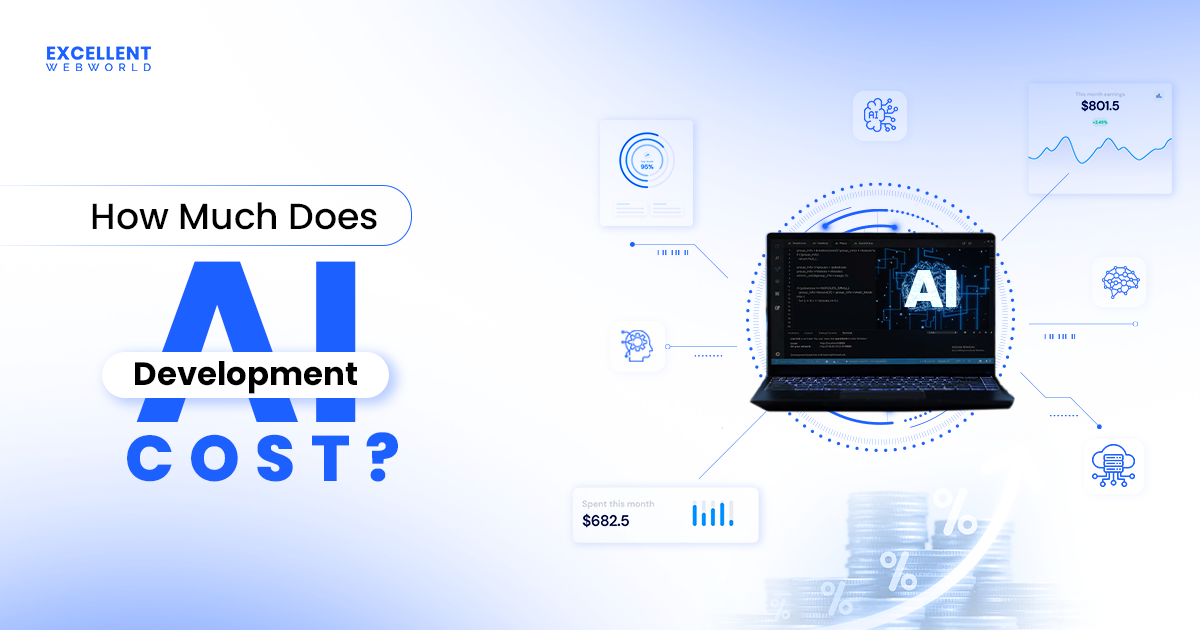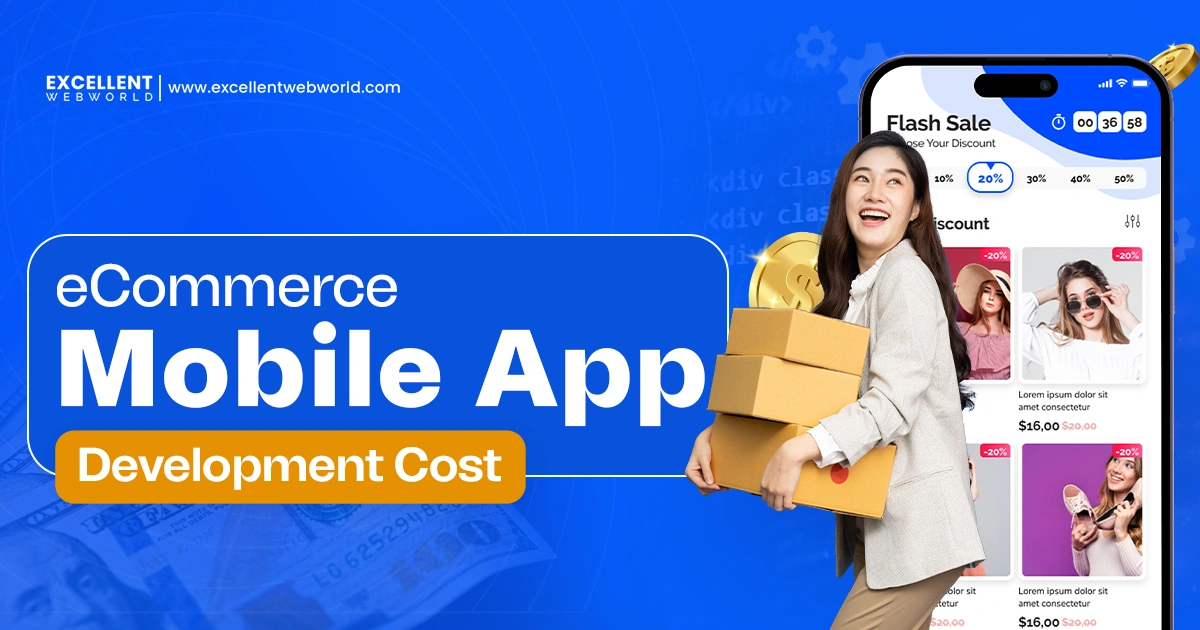Still wondering whether to adopt AI in retail? How long can you afford to wait while your competitors are scaling faster than you with AI?
From Amazon’s AI-powered predictive logistics to Zara’s data-driven inventory, the smartest players in the retail sector are already using artificial intelligence technology to transform the way they sell, serve, and scale. The question isn’t if you should adopt AI, but how fast you can catch up.
Businesses that are still dependent on traditional tools risk becoming invisible in a market where AI-driven personalization, speed, and automation become the new currency. AI isn’t just streamlining retail operations; it’s changing the magic of getting customer loyalty and profit margins.
At Excellent Webworld, our experts are always on the front lines of the technology trend shift. We engineer AI-powered retail apps, chatbots, personalized recommendation systems, and dynamic pricing engines for brands globally. Having consulted with our experts, we prepared this guide for you to understand how AI can be a good solvent to boost your retail business.
What is AI in Retail?
AI in retail is about using artificial intelligence technology to enhance retail sector operations, boost customer experience, and power other tasks such as optimizing merchandising, demand forecasting, and managing the supply chains.
It enables retailers to analyze customer data in one go, predict buying behavior, personalize shopping journeys, automate repetitive tasks, and give them customer lifetime value (CLV) prediction info. Ultimately, the use of AI in retail is driving smarter decisions, higher conversions, and more agile, customer-centric operations.
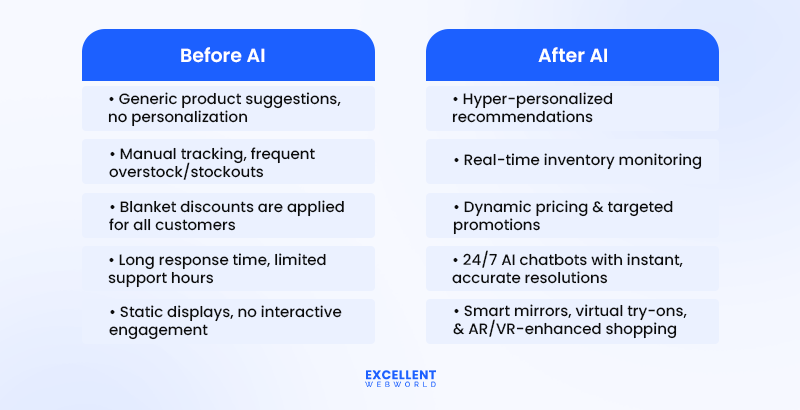
What Are Some Innovative AI Applications in The Retail Industry?
AI applications in retail actually transform every corner of the industry. From storefront to backend, here we mentioned 12 top AI use cases in retail that help brands like you to drive efficiency, personalize experiences, and gain a competitive edge.
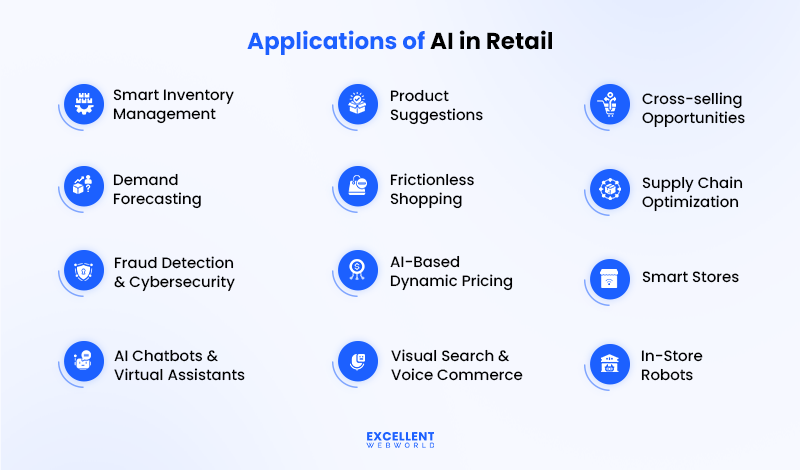
1. Smart Inventory Management
Artificial intelligence empowers retailers with real-time, demand-driven inventory optimization and control; it replaces all the burden of static Excel sheets, which need your consistent attention.
Systems such as RFID inventory management and smart shelves with AI technology track product movement, optimize storage, perform out-of‑stock prediction, and ensure the right stock is in the right place at the right time.
Pro Tip: Integrate AI inventory tools with your POS and warehouse management systems (WMS) to create a synchronized supply chain loop.
2. Personalized Product Recommendations
Using AI technology as a retailer helps you recommend products that are already searched for or placed in shopping carts by customers.
Considering the customer’s purchase histories and their saved items, the recommender systems show product recommendations directly in their feed. Also, it can track the data of similar user profiles and show products.
3. Enhanced Cross-Selling Opportunities
AI in retail performs market basket analysis (MBA) technique and analyzes transactional and behavioral data to uncover product affinities, which helps retailers to strategically provide complementary products during the buyer’s journey. This is the best and smartest way to increase the number of cart values without even overwhelming the shopper.
Expert Advice: Make sure to combine AI cross-selling with A/B testing to check which product placements and bundle suggestions give you the best conversion.
4. Supply Chain Optimization
AI in retail supply chain enhances the process by making it faster, smarter, and more responsive. From sourcing to final delivery, every link is optimized using AI-based predictive retail analytics and real-time data tracking.
5. Demand Forecasting
Using AI in retail transforms demand forecasting from static guesswork into an adaptive, data-driven engine. It means AI-powered systems made for demand forecasting help in assortment planning.
Using historical data, market trends, promotions, and even weather patterns, AI predicts which products will sell, when they will sell, where they will sell, and how much they will sell.
6. Frictionless Shopping
As the name suggests, it’s smooth and hassle-free. In this way of shopping, customers don’t have to wait in long lines for checkouts. Retailers integrate AI with video and sensor data, which eliminates point-of-sale areas; this lets customers pick items off store shelves, put them in their shopping baskets, and walk out of the store.
This application of AI in retail sector removes cashier lanes, enables intelligent order management, and allows mobile scan-and-pay & smart cart technology to make the shopping experience seamless and super fast.
7. Fraud Detection & Cybersecurity
Artificial intelligence technology monitors transactions across your retail ecosystem in real time by using anomaly detection and pattern recognition to find suspicious activities and prevent online fraud even without hurting genuine customer experiences.
The AI technology behind retail operations detects unusual purchase behavior, bot attacks, and account takeovers. Also, it secures payment gateway integrations with AI-based risk scoring models and helps you in reducing manual review time with loss prevention & higher fraud detection accuracy.
8. AI Chatbots & Virtual Assistants
AI chatbots are a means to offer instant and 24/7 customer support services across websites, apps, and social media. These virtual agents for retail services guide users, handle returns, suggest products, resolve complex issues, and answer all customer queries.
Additionally, chatbot analytics provide detailed insights into user behavior, chatbot performance, and overall effectiveness, which leads to better engagement, efficiency, and the achievement of business goals.
9. AI-Based Dynamic Pricing
The use of AI in retail industry allows you to build AI-driven dynamic pricing, which helps you to adjust pricing in real-time as per the market trends, demand fluctuations, competition, and customer behavior. This way, retailers can maximize revenue while staying competitive.
10. Visual Search & Voice Commerce
This AI application in retail sector gives smart experiences to customers by breaking product search barriers with visual integration and natural language processing (NLP).
Customers can easily search and find the products by snapping a picture or speaking casually with these AI features. It contributes to improving the mobile and hands-free shopping experiences.
11. Smart Stores
Smart stores use AI, IoT (Internet of Things), digital twins, federated learning, and computer vision to provide intelligent, personalized, and efficient physical retail experiences to customers. Using IoT in retail industry for physical stores leads to increasing revenue per square foot.
Technology like electronic shelf labels helps customers determine product pricing. Every customer action, such as entry, movement, and interaction, is a data point for continuous improvement.
12. In-Store Robots
These AI trends in retail sector have become an asset: robots with agentic AI technology help in enhancing customer service, monitoring shelves, and creating a futuristic atmosphere in stores. These Autonomous Mobile Robots (AMRs) can guide, inform, or automate routine tasks and reduce human errors while improving work efficiency.
What Are the Top Benefits of AI in Retail?
AI in retail benefits businesses in several ways, such as streamlining logistics, supply chain, and other operations, offering personalized shopping experiences to customers, increasing sales, and reducing returns. These benefits of AI in eCommerce ultimately make retail businesses smarter, faster, and more profitable.
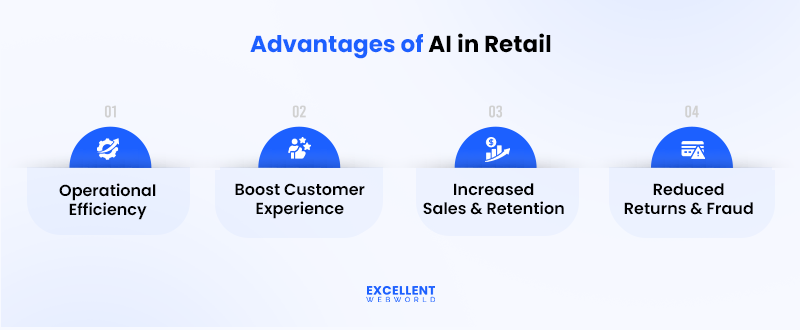
1. Operational Efficiency
AI in retail stores is transforming Supplier Relationship Management (SRM) by automating routine tasks such as inventory tracking, restocking, and demand forecasting.
This makes human dependency low and frees the human resources while minimizing errors. You can optimize logistics, reduce manual work, and operate more leanly and profitably than ever before.
2. Enhanced Customer Experience
Building conversational AI for retail plays a key role in enabling conversational commerce by delivering hyper-personalization, quick support with AI shopping bots, and a seamless shopping experience to customers with omnichannel integration.
Your consumers actually enjoy smarter product suggestions, faster checkouts, visual recognition, and tailored interactions that lead to higher satisfaction and consistent loyalty.
3. Increased Sales and Retention
Retailers like you can upsell, cross-sell, do cannibalization analysis, and serve seasonal offers perfectly using AI in retail business.
Determining accurate customer behavior, AI gives suggestions to customers as per their likes, dislikes, and sentiment analysis, which boosts conversions and keeps customers coming back with timely experiences and incentives.
4. Reduced Returns and Fraud
As the use of AI in retail commerce recommends better-fit products and flags inconsistent behavior, it ultimately reduces returns. It also detects and prevents fraud in real time, protecting both customers and retailers from costly cyber attacks, chargebacks, or data breaches.
What Are Some Real-World AI in Retail Use Cases?
As we already discussed in the beginning, AI adoption in retail isn’t theory; it’s delivering noticeable results for global brands. Let’s see how Amazon to Zara are winning with AI implementations, and how you can too.
| Real World Examples of AI in Retail | What Will They Get By Implementing AI in Their Business? | What Are the Final Outcomes With AI-Powered Inputs? |
|---|---|---|
| Amazon [Cashier-free Shopping] | ||
| Sephora [Makeup Assistance] | ||
| Zara [Robot Assisted Pickup] |
How to Get Started With AI in Retail?
Getting started with AI in retail isn’t just about integrating technology; in reality, it’s about strategy, scalability, and speed. So, where should you begin to ensure getting the best outcomes without wasting efforts?
Should You Build or Buy Your Retail AI Solution?
Confused about whether you should build or buy software for your retail AI solution? Keep the following things in mind before taking final decisions on building from scratch or buying a pre-built AI solution.
Make sure to consider timeline, budget, and customization needs while choosing an AI solution.
How to Choose the Right AI Development Partner for Retail?
Choosing the right AI development partner is more than just stretching your team; it’s about domain expertise, scalable architecture, and long-term support. You should consider an AI development company like Excellent Webworld for your AI-based retail needs, as we are rated as the number one firm with years of experience in technology.
What Do Retail AI Experts Recommend Before You Start?
Don’t jump without any knowledge, research, or expert advice. Here’s what AI consulting company Excellent Webworld’s retail AI strategists advise for setting a strong foundation before investing heavily in AI in retail.
What Are the Biggest Challenges Retailers Face While Implementing AI?
Businesses like yours in the retail industry mostly struggle with AI due to data privacy concerns, expensive tech integration, and a lack of in-house AI expertise. Let’s understand what they are and how to overcome them.
1. Data Privacy and Ethics
AI in retail needs huge consumer data. Without strong data governance and ethical frameworks, personaization efforts can result negatively, possibly hurt customer trust, and violate privacy regulations like GDPR or CCPA.
Solution: Use anonymized data, adopt privacy-by-design, and partner with firms like Excellent Webworld, which follow ethical AI practices for IT development.
2. High AI Integration Costs
AI tools mostly require customization, system upgrades, and cloud migration, which makes AI integration in software development a costly subject, especially for retailers still dependent on outdated legacy systems.
Solution: Start small with Generative AI MVPs and opt for scalable AI frameworks and AI-as-a-Service models.
3. Skill Gaps and Infrastructure Needs
A shortage of skilled AI professionals and tech infrastructure slows down adoption. Hiring AI experts can be expensive for many retailers; also, they face talent gaps and lack resources to run large-scale AI projects in-house.
Solution: Hire AI developers from a reputed firm like Excellent Webworld, which has a strong portfolio with AI and a team of experts who use cloud-native, pre-trained AI solutions to bypass complexity.
What Are the Future Trends of AI in Retail for 2025 and Beyond?
The AI trend in retail is offering a transformative phase, which leads to operational efficiency and immersive, predictive, and sustainable experiences. Let’s see key trends that will be known as future-forward innovations to reshape the industry.
Final Thoughts: Ready to Build Your AI-Powered Retail Business?
The retail industry revolution is already being taken over by artificial intelligence, which offers intelligent automation, predictive insights, and hyper-personalized experiences. The real question is for you and your business: Are you ready to lead with AI or lag behind?
At Excellent Webworld, we’ve helped many global retailers turn their AI business ideas into scalable solutions. From AI chatbots to dynamic pricing engines, our AI experts have built everything efficiently. As rated #1 AI-powered retail and eCommerce development company, we combine domain expertise with next-gen technologies to future-proof your business. Connect to build with AI.
Frequently Asked Questions (FAQs)
AI use cases in retail industry automate personalization, product recommendations, dynamic pricing, and fraud detection. This leads retailers’ businesses to boost efficiency, engagement, and conversions in digital shopping environments.
Top use cases include:
AI ensures fewer stockouts, improved planning, and optimized supply chains.
Integrating AI in apps for retail business enables hyper-personalized shopping, 24/7 virtual assistance, visual search, and seamless checkout experiences, which leads to faster, smarter, and more satisfying buyer journeys across channels.
Data fuels AI models. The richer your product, customer, and behavior data, the more accurate your AI becomes. This way, you can achieve offering smarter recommendations, forecasting, and automation at scale.

Article By
Mayur Panchal is the CTO of Excellent Webworld. With his skills and expertise, He stays updated with industry trends and utilizes his technical expertise to address problems faced by entrepreneurs and startup owners.

